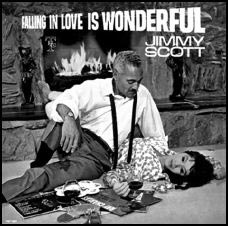I AM NOT A romantic individual. My boyfriend e-mailed me a love note the other day, and I swear to god, I criticized the grammar.
In light of my disposition, this week I originally planned to honor Valentine’s Day by discussing the new When Love Goes Wrong: Songs for the Broken-Hearted, which compiles 15 vocal jazz classics for the disconsolate culled from the Verve Records catalog. “Slap this CD into the hi-fi and wallow,” proclaims the jacket copy. “There is no hope. . . . “
But you know what? There is hope on this CD. It comes early, track four to be precise, right after melancholy turns by Billie Holiday, Chet Baker, and Johnny Hartman. The selection is “Everybody’s Somebody’s Fool.” The singer is Little Jimmy Scott.
The mere fact that Verve attributes the performance to Scott is uplifting. When the recording was originally issued, in 1950, the label simply read “Lionel Hampton, Vocal With Orchestra.” Because of his unusually high vocal timbre, many listeners assumed the uncredited vocalist was Irma Curry, Scott’s female colleague in the vibraphonist’s big band. Lingering on the Billboard R&B charts for six weeks, “Fool” was the closest Scott would come to tasting big success for over 40 years—yet virtually nobody knew who the singer was.
“It sometimes seems that great vocalists each sing but a single song,” writes David Ritz in Faith in Time: The Life of Jimmy Scott (Da Capo Press, 2002). “Everything else becomes variations on a theme.” For the remainder of his career, observes Ritz, everything else Scott sings would be colored by the same mix of hope and despair and a yearning for—and belief in—a love that truly lasts that inform his performance of “Fool.”
Scott had plenty of heartache to draw on. Until his fortunes finally turned, at age 68, his life was hardly greeting-card fare. In early adolescence, the Cleveland native was diagnosed with Kallmann’s Syndrome, a genetic condition that inhibits growth and sexual development and is the source of his boyish appearance, slight build, and unique voice. Not long after, his mother was killed in an accident, and his family was split up. As for his quest for love that lasts, Scott was on his fourth marriage when he finally hit it big in 1992 with All the Way. His professional life hadn’t been much better, littered with bad deals and missed opportunities. And perhaps the best example in the former category is the tale of his 1962 LP Falling in Love Is Wonderful.
In the early ’60s, Ray Charles was riding high on the back of “What’d I Say,” “Georgia on My Mind,” and “Hit the Road Jack.” And when he set up his own record label, Tangerine, one of the first artists he recruited was Scott, whose career had seriously stalled. Charles was a longtime fan, and, unlike others in the business, had a clear vision of what to do with Scott’s distinctive talent: Record the ultimate sad-song platter, a collection of ballads that highlighted the singer’s ability to illuminate a lyric, as well as his behind-the-beat phrasing and love of slow tempos.
In keeping with that concept, the vibe of Falling in Love . . . is relaxed, featuring light strings and woodwinds, with arrangements divvied between Gerald Wilson and Marty Paich. Charles played piano and produced, but the star is Scott, who imbues 10 standards, including “I Wish I Didn’t Love You So,” “Someone to Watch Over Me,” and “How Deep Is the Ocean,” with the same potent emotional blend that transformed “Fool” from a so-so song into a signature tune. At 37, Scott’s voice was in its prime—the insecurities of pitch that plague him today were still far off.
Falling in Love . . . is Scott’s finest hour, musically, and it should have made him a star. But within a month of release, Charles was contacted by the owner of another label, who insisted he still held a valid contract with Scott. Tangerine immediately withdrew the record from stores.
Fortunately, after four decades in the vaults, the connoisseurs at Rhino Handmade (www.rhinohandmade.com) have finally issued Falling in Love . . . on CD. If you only know Scott through his affiliations with David Lynch and Lou Reed or his questionable renditions of songs by Simply Red and Prince from 1998’s Holding Back the Years, this album will come as a revelation.
When Love Goes Wrong features fine fare, but playing that CD feels akin to getting an earful on how to weather a breakup from 15 different individuals. Listening to Scott pour his soul into Falling in Love Is Wonderful, on the other hand, is like having a good, hard cry on your best friend’s shoulder: raw, honest, and unguarded. It will break your heart in the best possible way. And even an unsentimental clod like me can appreciate the beauty of that.







